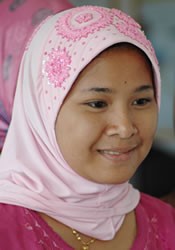Kutai in Indonesia

Photo Source:
Greg n Trees
|
Send Joshua Project a map of this people group.
|
| People Name: | Kutai |
| Country: | Indonesia |
| 10/40 Window: | Yes |
| Population: | 248,000 |
| World Population: | 248,000 |
| Primary Language: | Malay, Tenggarong Kutai |
| Primary Religion: | Islam |
| Christian Adherents: | 0.25 % |
| Evangelicals: | 0.25 % |
| Scripture: | Portions |
| Ministry Resources: | No |
| Jesus Film: | Yes |
| Audio Recordings: | No |
| People Cluster: | Banjar of Kalimantan |
| Affinity Bloc: | Malay Peoples |
| Progress Level: |
|
Introduction / History
Partially due to their frequent relocations, the Kutai live spread out along the eastern coast of East Kalimantan. Tenggarong is the heart of their area today, as when Mulawarman ruled from it as the capital of the Kutai kingdom, the oldest Hindu kingdom in Indonesia. The Kutai language branches from the Malay language cluster.
What Are Their Lives Like?
In the past, the Kutai had a system of social classes that included nobleman, ordinary people and slaves. The nobility used to be called Kramas, Mas, Aji, Radenor Pangeran Datu. Today, respect is given to people based on their education and wealth, not their title. The Kutai have a rich variety of traditional ceremonies. The Pesta Erau (Erau party), one of the biggest ceremonies, annually commemorates the founding of Tenggarong city. The party lasts five days and five nights. Throngs of Dayaks come even from very remote villages and perform many kinds of interesting dances, such as kancet pepati (warrior dance), kancet ledo (gong dance), datun, leleng, gantar and pilin tali. A dragon doll is thrown into the Mahakam River at the ceremony's climax. This is a symbolic way of asking blessings for wealth and prosperity from their ancestors.
The Kutai make their living as farmers, fishermen and hunters. East Kalimantan is the richest province in Indonesia and Kutai Tenggara constitutes the richest regency in Indonesia. Therefore, they rarely leave their home area, having little economic reason to do so. Many Kutai people, however, do not prosper because of drastic imbalances in income. Some inland Kutai still follow a traditional system of law. Traditional Kutai law provides for several key leaders: a village leader who conducts traditional ceremonies, a security chief and a protector of inherited wealth. The government recognizes these leaders, calling them petinggi ("high ones"). Tenggarong city used to be the center of Kutai Kartanegara kingdom and still has various historical and cultural sites, such as the Tenggarong palace. The palace is now used as the Mulawarman museum, which houses Kutai Martadipura and Kutai Kartanegara royal treasures.
What Are Their Beliefs?
Generally, the Kutai are Muslims. However, in their daily life, they still worship spirits. Certain royal heirlooms are sacred, such as a gold crown decorated with jewels, the uncal necklace, the image of wisnu (a Hindu god) necklace and a necklace with two mythical birds. Kutai beliefs are focused on seeking protection from the Sanghyang (a Hindu word for spirits) through magic by appeasing and controlling both good and bad spirits. Previously, the Kutai were Hindu and they were called 'Kaharingan'. Since then, however, most people in the Kutai area have turned to Islam. This has resulted in much mixing between the faiths of Islam and Hinduism.
What Are Their Needs?
The Kutai need better transportation infrastructure to assist the remote villagers in taking their crops and commodities to the market. At present, the main form of transportation is by sea and river, as land transportation is very difficult.
Prayer Points
Pray for the Holy Spirit to move in Kutai communities in such a way they will accept the blessings of Christ's goodness and lordship.
Pray for a spiritual openness among the Kutai that will lead them to the cross and the empty grave. May they rejoice in Christ's resurrection victory!
Pray for loving workers in Kutai communities.
Pray for Kutai disciples to make more disciples.